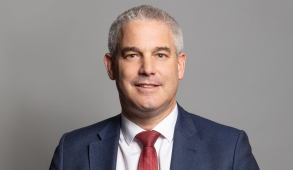Clarity needed on funding for agenda for change pay deal
Under the deal, announced on Thursday afternoon, agenda for change staff will receive two one-off payments plus a 5% increase in 2023/24. Most of the unions involved, including the Royal College of Nursing, Unison, the GMB, the Royal College of Midwives and the Chartered Society of Physiotherapy, are recommending the offer to their members.
Health and social care secretary Steve Barclay (pictured) said the offer ‘will give nurses, paramedics, physiotherapists and other non-medical staff a fair pay rise while protecting our commitment to halve inflation’.
Staff will receive a 2% non-consolidated payment worth 2% of an individual’s salary for 2022/23. This is on top of the imposed pay increase that was awarded in 2022/23 of £1,400 (enhanced for bands 6 and 7). The original award was recommended by the NHS Pay Review Body, although it was rejected by unions, who argued that the offer had been overtaken by spiralling inflation, leading to industrial action.
In addition, staff will receive a one-off ‘NHS backlog bonus’. This bonus ranges from £1,250 for bands 1 to 4 to £1,600 for band 9 and overall is the equivalent to 4% of the agenda for change pay bill. Finally, the deal also includes a 5% consolidated increase in pay for 2023/24.
As a result of the new package, a newly qualified nurse will see their salary go up by more than £2,750 over two years from 2021/22 to 2023/24, while also receiving more than £1,890 in one-off payments. The deal will also mean higher pay lifts for the lowest paid staff, with all those in bands 1 and 2 having their pay raised to the same level.
The government said it had also committed to a number of additional reforms. The suspension of pension abatement rules, introduced during the pandemic, will be made permanent and measures will be introduced to ensure safer staffing levels in hospitals. Taken together, RCN chief executive Pat Cullen said the package represented ‘real tangible progress’. As well as the additional money now, we have made real progress with the government on safe staffing measures, a new pay structure for nursing, support for newly qualified staff and pensions too,’ she said.
Crucially the government also offered a ‘guarantee’ that there would be ‘no impact on frontline services or the quality of care that patients receive as a result of this pay offer’.
Julian Hartley, chief executive of NHS Providers said the pay deal was a ‘hugely positive development after months of strike action’. He also welcomed the guarantee of no impact on frontline services. ‘We take this to mean that the deal is fully funded rather than relying on raids on NHS budgets, taking money away from key services. This is crucial to the success of the deal.’
Matthew Taylor, chief executive of the NHS Confederation also called on the government to spell out the funding arrangements. ‘Leaders will be keen for the government to explain the full mechanics of how this award will be funded and stress that any funding for the award should not come out of already stretched NHS budgets,’ he said. ‘Otherwise, it will be a situation where we are robbing Peter to pay Paul with patients bearing the costs.’
Ben Zaranko, senior research economist at the Institute for Fiscal Studies, said he presumed funding for the one-off bonus or backdated element would come from the Treasury. But the permanent, consolidated 5% pay award raised bigger questions. ‘There was no additional funding provided in the Budget for this purpose,’ he said, adding that the 5% offer rather than the 3.5% originally claimed as affordable, would add around £1.5bn to the NHS pay bill. There was a track record of the NHS being asked to ‘absorb these additional costs’. It was ‘unclear’ if the Treasury would eventually provide the funding required to cover the cost of the deal, he said. But if it did, ‘that would be a material alteration to the spending plans contained in Wednesday’s Budget before the ink is dry’.
There is increasing pressure now for the government to open negotiations with the British Medical Association over a pay deal for junior doctors to prevent further strike action.
Related content
The Institute’s annual costing conference provides the NHS with the latest developments and guidance in NHS costing.
The value masterclass shares examples of organisations and systems that have pursued a value-driven approach and the results they have achieved.